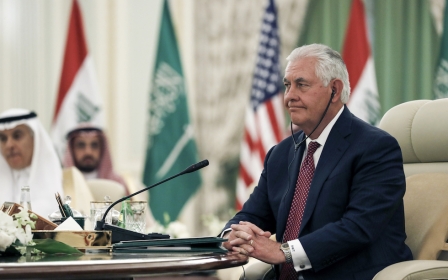Trump's Iran deal bluff: Republicans are likely to blink

It’s no secret that President Donald Trump's administration has been an abject failure in terms of legislative accomplishment.
Every one of the supposed hallmarks of his agenda has failed when brought before Congress; including the repeal of the Obama healthcare plan, the building of a wall with Mexico, restrictions on immigration and repeal of the Dreamer Act, and tax reform (so far).
Because of these failures, he has largely had to resort to executive orders to implement many of these campaign pledges.
Utter failure
The problem with such directives is that they are only in force during the term of the president who signs them. They have no power once that person leaves office. That means that the orders themselves do not provide a legacy that will continue after the next president is elected.
That is but one of the many differences between Donald Trump and his predecessor, Barack Obama, whose list of legislative accomplishments was long, though he too resorted to executive orders when necessary.
Trump's approach to Iran has also been an utter failure. He talks a good game, mimicking the bellicose rhetoric of his ally, Israeli Prime Minister Benjamin Netanyahu. He called the nuclear agreement, shepherded into existence by Obama and his European allies, the worst deal in history. He promised to undo it the first chance he got.
But when push came to shove, he backed down. Required to certify Iranian compliance every three months, he did so twice.
On the third go-round, he punted. He refused to certify Iranian compliance despite the determination by every relevant major power and international body that Iran was complying. He set in motion a political process which offered Congress 60 days to determine whether to impose new sanctions upon Iran.
The pause button
But a strange thing has happened in the course of the transition from the presidency of Obama to Trump. The Republican Party shifted from being the opposition to being the ruling party (in European terms). As a result, the party which had railed against the nuclear deal and sabotaged it at every opportunity under Obama, suddenly became a semi-responsible adult.
GOP leaders realised that they could no longer blame Obama for the failure of the deal or for Iran's building of a nuclear weapon. In the current circumstances, they would be blamed if that happened. Suddenly, GOP senators weren't as keen to blow it up.
When faced with the prospect of imposing new sanctions, breaking off from America's European partners who remained committed to it, and losing major commercial deals like the Boeing airplane sale, the Republicans hit the pause button.
The likelihood Corker will spearhead a legislative attack on the nuclear deal appears slim
Another obstacle is US public opinion, which strongly favours the nuclear deal. A recent CNN poll found that 67 percent of Americans favor it and only 27 percent feel the country should withdraw. Further, only 30 percent of Americans believe that Iran poses a threat to the US. That's down from nearly 50 percent in 2015. That's the smallest percentage since polling began on this question in 2000.
In addition, Trump faces another possible Congressional obstacle: the chair of the Senate foreign relations committee is Senator Bob Corker. He and the president have been sparring angrily with each other via media interviews and Twitter for weeks. The likelihood Corker will spearhead a legislative attack on the nuclear deal appears slim.
Moreover, though Israel's leadership continued to bray against the nuclear deal, Israeli security hawks like Uzi Arad and Ehud Barak came to Washington and told legislators that the deal was one Israel could live with comfortably. Even more important, they told them that the prospect of having no deal in place was terrifying in terms of where it might lead.
A disaster for the Republicans
Though it's a dangerous game to predict what may happen when Congress does take up the deal, since the Trump presidency has been one of the most erratic and unpredictable in US history, it seems unlikely that the US Congress will devise a coherent legislative response to Trump's decertification.
It knows that if it strangles the deal with a host of punitive sanctions it will likely result in Iran terminating the agreement. The Iranian leadership has made clear that it will resume its nuclear programme in that event.
This in turn would mean the likelihood of Iran either developing WMD or the capacity to produce one quickly if necessary (much like Japan's nuclear posture). The result would be a disaster for the Republicans who would take the blame for this failure.
It appears more likely Congress will do what Trump did: Step up to the brink and blink
Though the Republicans have not been known for their ability to see beyond the next news cycle, even they can look far enough into the future to see that this is a prospect that would delight Democrats, who would tar and feather their opponents.
Though this is by no means a conventional political situation, even Republicans have to admit that they have enough headaches with other items in their failed agenda that they don’t need yet another by torpedoing the nuclear deal.
Left in the cold
There is, of course, a possibility that the Republican Congress will leap like lemmings over the cliff and pass new sanctions and reinstate those removed by the P5+1 agreement. They have, after all, tried not once, twice, but four times and failed to overturn the Affordable Care Act.
And there is a sizable chunk of their constituency which supports regime change against Iran and would delight in junking the nuclear agreement. It would be a nihilistic approach, but this does seem to be the Age of Nihilism in Washington these days.
If the US backs out of the deal it will mean disaster for US Iran policy. The rest of the P5 nations (Germany, France, Britain, Russia and China) will reaffirm their commitment to it. They will continue both removing sanctions and signing record commercial deals with Iran. They will also resume buying Iranian oil, one of the country's main exports. Here in the US, we will be left out in the cold.
This is an administration that governs not with a bang, but a whimper
The only forces happy with this outcome will be the hardliners both in the US Congress and Iran.
Nonetheless, it appears more likely Congress will do what Trump did: step up to the brink and blink. They will pick a path that appears to show resolve against Iran without having much substance or teeth.
Perhaps they will tighten existing sanctions or introduce new ones. At worst, they will tinker. But they will take no decisive action that would cause a fatal rupture with our allies and an Iranian nuclear breakout.
This is an administration that governs not with a bang, but a whimper.
- Richard Silverstein writes the Tikun Olam blog, devoted to exposing the excesses of the Israeli national security state. His work has appeared in Haaretz, the Forward, the Seattle Times and the Los Angeles Times. He contributed to the essay collection devoted to the 2006 Lebanon war, A Time to Speak Out (Verso) and has another essay in the upcoming collection, Israel and Palestine: Alternate Perspectives on Statehood (Rowman & Littlefield).
The views expressed in this article belong to the author and do not necessarily reflect the editorial policy of Middle East Eye.
Photo: US Republican presidential candidate Donald Trump arrives to address a Tea Party rally against the Iran nuclear deal at the US Capitol in Washington September 9 2015 (REUTERS/Jonathan Ernst)
Stay informed with MEE's newsletters
Sign up to get the latest alerts, insights and analysis, starting with Turkey Unpacked
Middle East Eye delivers independent and unrivalled coverage and analysis of the Middle East, North Africa and beyond. To learn more about republishing this content and the associated fees, please fill out this form. More about MEE can be found here.






